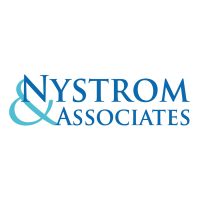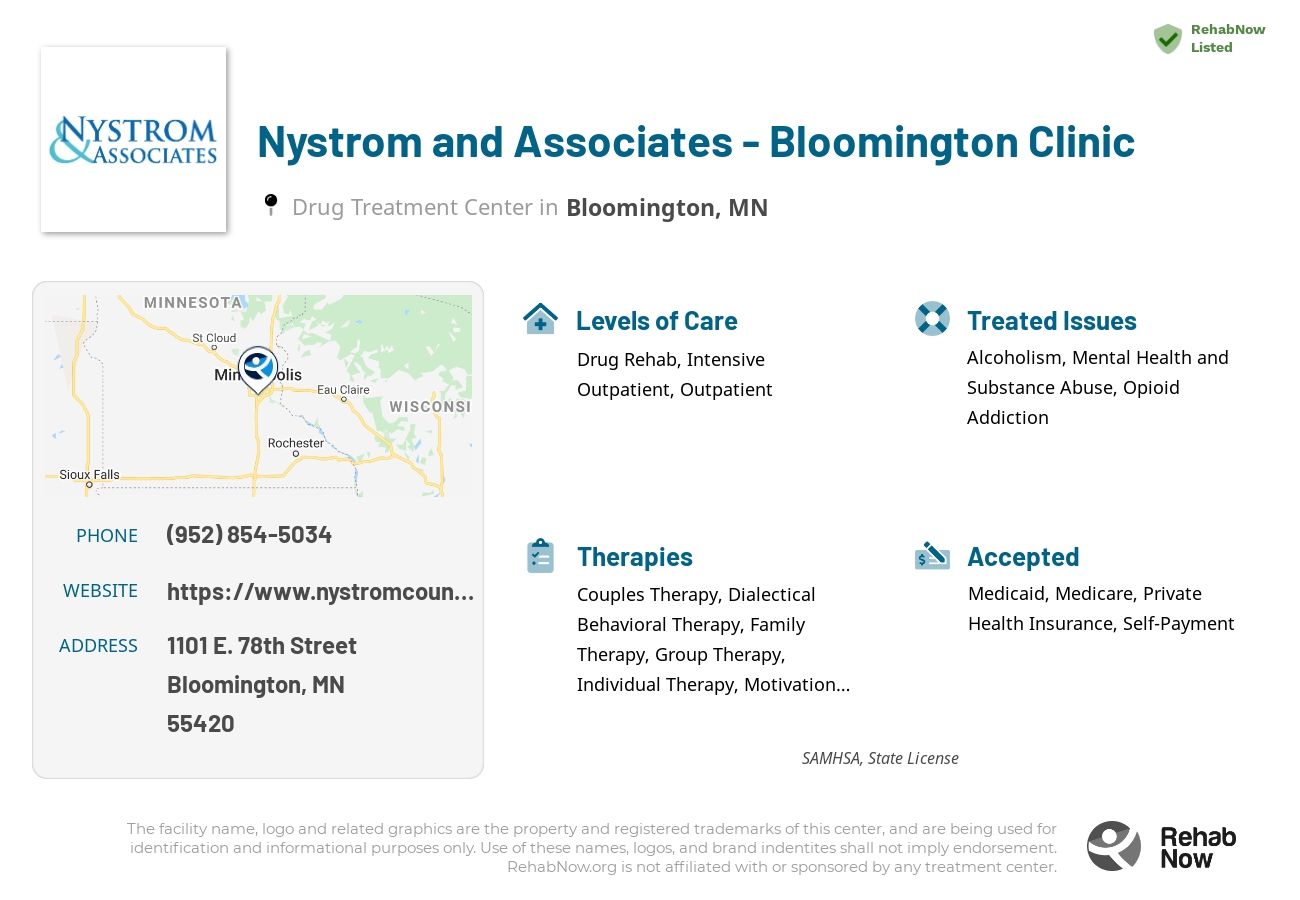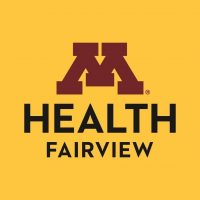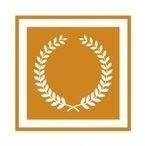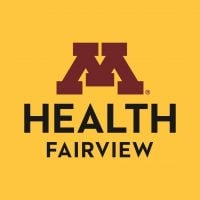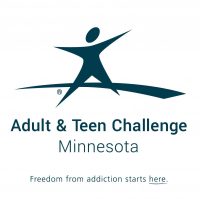Nystrom and Associates - Bloomington Clinic
Drug Rehab Center in Bloomington, Minnesota
Nystrom and Associates - Bloomington Clinic offers evidence-based treatment programs, aftercare support groups, employment assistance, and relapse prevention education to help patients overcome addiction through individualized plans.
About Nystrom and Associates - Bloomington Clinic in Minnesota
Nystrom and Associates – Bloomington Clinic, located in Bloomington, Minnesota, is a private rehab facility that stands out for its specialized focus on treating alcoholism, drug addiction, mental health, substance abuse, and opioid addiction. This clinic is recognized for its comprehensive, personalized treatment plans and its commitment to helping clients build healthier lifestyles through a variety of evidence-based treatments and supportive therapies.
- Offers a wide range of treatments including Cognitive Behavioral Therapy and Dialectical Behavior Therapy to address alcoholism, drug, and opioid addiction.
- Provides Intensive Outpatient, Outpatient, and Aftercare Support Levels of Care, catering to the specific needs of each individual.
- Accredited by SAMHSA and holds a state license, ensuring high standards of care and adherence to best practices in addiction treatment.
Nystrom and Associates – Bloomington Clinic is not only accredited by SAMHSA but also holds a state license, showcasing its dedication to maintaining high-quality care standards. The clinic accepts private health insurance, making its comprehensive services accessible to a broader range of individuals seeking help for addiction and related mental health issues.
The clinic addresses a variety of addictions and issues, including alcoholism, drug addiction, substance abuse, and opioid addiction, using a blend of treatments such as Cognitive Behavioral Therapy, Dialectical Behavior Therapy, and alternative therapies like yoga and acupuncture. By offering different levels of care, including Intensive Outpatient and Outpatient services, Nystrom and Associates – Bloomington Clinic tailors its approach to meet the unique recovery needs of each client.
Genders
Ages
Modality
Additional
Accreditations
State License
SAMHSA
Conditions and Issues Treated
Substance abuse is a severe problem that affects many people in Bloomington, MN. It is characterized by the excessive and inappropriate use of drugs, including alcohol, medications, and illicit drugs. Substance abuse can lead to physical or psychological dependence and affect social life and relationships. Treatment options include medications, counseling sessions, behavioral therapy, and group therapy. If you are suffering from substance abuse, contact for the latest treatments available.
Opioid addiction is when someone becomes addicted to opioids. This can happen quickly due to any opioid use. Opioid withdrawal can be uncomfortable and lead the user to continue using even if they want to quit. It’s best to receive inpatient treatment for detoxification.
Even if a person doesn’t need inpatient treatment, it’s recommended to start rehabilitation or at least some kind of outpatient treatment. This is because the withdrawal symptoms from opioids can be uncomfortable and unpleasant, to the point that a person could end up using again or worse.
Detoxification should be done to break the physical addiction of opioids. This can be done with opioid replacement therapy, medication-assisted therapy, or a more traditional detoxification program. Intensive outpatient treatment is a form of addiction care that allows patients to continue living at home while undergoing treatment. This type of care is appropriate for patients who have been treated in residential treatment programs. Intensive outpatient programs include regular visits to the facility providing therapy, and patients gradually return to their routine life. IOP benefits most when patients have a supportive family member or friend to help them recover.
The first step to getting into an intensive outpatient program is to attend a detoxification facility. Detoxification facilities are designed to remove substances from the body safely. The patient will attend sessions designed to help them understand their addiction and its impact on their lives. While in an intensive outpatient program, therapy sessions are scheduled three to five times per week, with the patient attending no more than two sessions in one day.
Levels of Care Offered
This center offers a variety of custom treatment tailored to individual recovery. Currently available are Aftercare Support, Drug Rehab, Intensive Outpatient, Outpatient, with additional therapies available as listed below.
An intensive outpatient treatment program, or IOP, is set up for those struggling with an addiction to begin the recovery process. However, the patient will not live at the facility during treatment.
IOP involves patients coming in and out of a medical office building regularly to receive therapy and other services while continuing their life outside of these visits.
IOP is a step up from drug detoxification or alcohol detox. However, it’s still considered a phase of recovery rather than the ultimate goal. There are many rehabs and treatment facilities available to patients in need of IOP.
Outpatient treatment consists of counseling and therapy sessions. The outpatient treatment process begins with the addict’s initial detox period, lasting about ten days. Outpatient treatment is used for those who are at moderate risk for “slipping back” into the addiction. It is also used for those who are not currently experiencing any side effects from withdrawal, can handle social pressure, have a stable living environment, and have a good support system.
Aftercare support is often overlooked in the treatment of drug and alcohol addiction. However, it’s an essential part and should be considered when planning a course of rehab.
Aftercare is a term that’s used to refer to any sort of continuing care offered for a drug addict who has voluntarily entered a rehabilitation program. This type of care can be provided in several settings, including outpatient therapy sessions after the addict has completed an inpatient program. There are also 12-step support groups, such as Alcoholics Anonymous, which can provide additional help for addicts trying to stay sober.
Aftercare is vital because addicts often face many challenges as they attempt to recover from drug addiction or alcoholism. Because of the powerful nature of these addictions, those who struggle with a drug or alcohol problem will likely have to face the craving for their substance of choice for the rest of their lives. Recovering can be a lonely and frustrating endeavor, especially without the support of others who are going through similar situations.
Therapies & Programs
Individual Therapy is a crucial component of addiction recovery. Therapists work with patients to identify the root of their addiction and figure out how to better handle the issues that led to them using drugs. Individual Therapy is one on one sessions where people meet with their therapist. Individual therapy provides a safe space for people to open up and discuss personal and sensitive topics which they may not feel comfortable discussing in a group setting.
In this type of therapy, therapists can develop specific solutions for each patient, which helps speed up their recovery process. In addiction recovery, therapy is a crucial part. It allows patients to go deep into their core issues and discover how those problems can be better handled now. Therapy can be performed in individual sessions as well as group settings. In individual therapy for addiction, the patient meets with the therapist one-on-one to focus on the underlying issues of addiction and come up with solutions to prevent future abuse.
Addiction can take a heavy toll on relationships, damage the trust and intimacy that was once there. Couples therapy at Nystrom and Associates - Bloomington Clinic helps to rebuild the trust and intimacy that has been damaged. An intimate relationship with a drug addict is not healthy for children or anyone in the family. Therapist help to rebalance family roles and create a healthier environment after rehab in Bloomington, MN.
Family therapy is a crucial part of drug treatment and getting sober. It is one of the most effective ways to help addicts stay on the path to long-term sobriety. One of the most important parts of family therapy is the relapse prevention plan. During treatment, therapists and doctors will often sit down with the addict and their family to develop a plan if the addict ever feels like they want to use again. This plan should involve steps the addict and family can take together to prevent them from relapsing in the future.
An addict’s family can play a vital part in helping them to avoid relapse because they can spot the warning signs and help them get back on track before it becomes too much of a problem. Family therapy is one of the most effective ways to help addicts stay on the path to long-term sobriety.
Group Therapy is employed by drug treatment centers like Nystrom and Associates - Bloomington Clinic to provide the recovering addict with a platform to talk about their feelings and experiences. It also provides for an opportunity to learn from other addicts who have successfully overcome their addiction. It is recommended that all group members be recovering addicts for this type of therapy to work.
This type of therapy involves the use of a variety of therapeutic techniques to help addicts recover from past traumas that might have triggered their substance abuse. During these sessions, therapists will work with the addict to address painful memories and learn how to cope effectively with stressors as they arise.
During these types of sessions, therapists will typically focus on three main goals:
- Identifying and expressing painful emotions associated with past traumas.
- Reducing the effects of stress on an addict’s life by developing more effective coping mechanisms.
- Developing healthy ways of thinking about stressful situations that can help addicts avoid substance abuse issues in the future.
This type of therapy is typically used in conjunction with other types of addiction treatment services. By identifying and dealing with the root cause of addiction, most addicts can overcome their cravings and prevent relapse once they leave rehab.
Many different types of addiction treatment services exist to help addicts safely get sober, but it’s important for recovering individuals to find a therapist or support group that will help them address the root cause of their addiction.
Dialectical behavior therapy (DBT) is a type of cognitive behavioral therapy that is focused on helping those with problematic behaviors caused by intense emotions and thoughts control and regulate their emotions and behavior.
Dialectic Behavior Therapy is beneficial for:
- People who have chronic suicidal thoughts and behaviors
- People who have chronic drug cravings
- People who have difficulty establishing and maintaining personal relationships
- People who have a mental disorder such as Borderline Personality Disorder
- People who have experienced trauma in their life
Rational Emotional Behavior Therapy (REBT) offers benefits to addicts in a wide range of situations. This type of therapy helps individuals better understand their emotions and how to manage them in a healthy way.
Individuals who have used addiction treatment services have found this type of therapy beneficial in the following ways:
- Helps individuals identify, understand and manage their emotions in a healthier way
- Assists addicts in developing coping skills to help avoid relapse
- Encourages increased tolerance and less judgmental thinking
- REBT combines cognitive and emotive techniques to help individuals overcome harmful, self-defeating behaviors.
Payment Options Accepted
For specific insurance or payment methods please contact us.
Is your insurance accepted?
Ask an expert, call (888) 674-0062
Nystrom and Associates Associated Centers
Discover treatment facilities under the same provider.
- Nystrom and Associates - Big Lake Clinic in Big Lake, MN
- Nystrom and Associates - Moorhead Clinic in Moorhead, MN
- Nystrom and Associates - Sartell/St. Cloud Clinic in Sartell, MN
- Nystrom and Associates - Woodbury Clinic in Saint Paul, MN
- Nystrom and Associates - Rochester Clinic in Rochester, MN
Learn More About Nystrom and Associates Centers
Additional Details
Specifics, location, and helpful extra information.
Bloomington, Minnesota 55420 Phone Number(952) 854-5034 Meta DetailsUpdated April 15, 2024
Staff Verified
Nystrom and Associates - Bloomington Clinic Patient Reviews
There are no reviews yet. Be the first one to write one.
Bloomington, Minnesota Addiction Information
Minnesota is fighting an opioid epidemic that is leaving hundreds of its residents dead each year. Both prescription opioids and illicit opioids are widely abused in the Land of 10,000 Lakes. Heroin continues to be one of the most commonly abused drugs in the state, if not the most common illicit drug. Over 10% of all treatment admissions in Minnesota list heroin as their drug of choice.
In Minnesota's Bloomington, drug abuse is a serious issue. According to recent statistics, over 1,600 drug-related arrests in the city in 2016. Additionally, over 8,000 hospital visits related to drug abuse in 2015. The most commonly abused drugs include marijuana, prescription painkillers, and heroin. There are a variety of rehabilitation programs in Bloomington. Many of these offer inpatient and outpatient services, and they cater to people with all levels of addiction.
Treatment in Nearby Cities
- Wyoming, MN (35.3 mi.)
- Pipestone, MN (162.2 mi.)
- Bemidji, MN (196.5 mi.)
- Sauk Rapids, MN (67.1 mi.)
- Littlefork, MN (245.1 mi.)
Centers near Nystrom and Associates - Bloomington Clinic
The facility name, logo and brand are the property and registered trademarks of Nystrom and Associates - Bloomington Clinic, and are being used for identification and informational purposes only. Use of these names, logos and brands shall not imply endorsement. RehabNow.org is not affiliated with or sponsored by Nystrom and Associates - Bloomington Clinic.
